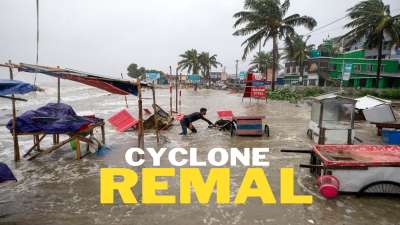The arrival of Cyclone Remal occurred at 8:30 pm on Sunday, impacting the coastal regions of West Bengal and Bangladesh in the vicinity of the southwest of Mongla.
n a devastating turn of events, Cyclone Remal has wreaked havoc in the state of West Bengal, leaving a trail of destruction in its wake. With reports confirming four fatalities and nearly 15,000 houses damaged, the cyclone has inflicted significant hardship on communities across the region.
Cyclone Remal, a powerful tropical cyclone, made landfall in the coastal areas of West Bengal with ferocious intensity.
The cyclone brought with it destructive winds, heavy rainfall, and storm surges, causing widespread devastation in its path. As the cyclone barrelled through the region, it left a trail of destruction, uprooting trees, damaging infrastructure, and inundating low-lying areas with floodwaters.
The cyclone made landfall with ferocious intensity, unleashing powerful winds, and torrential rainfall that battered coastal areas and inland regions alike. The impact of Cyclone Remal was felt across West Bengal, with vulnerable communities bearing the brunt of its destructive force.
The loss of life is a tragic consequence of Cyclone Remal’s fury. Four individuals have tragically lost their lives in the storm, underscoring the deadly potential of such natural disasters. As families mourn the loss of their loved ones, the devastation serves as a sobering reminder of the urgent need for disaster preparedness and mitigation measures.
In addition to the human toll, Cyclone Remal has inflicted extensive damage to property and infrastructure. Nearly 15,000 houses have been damaged or destroyed, leaving thousands of families homeless and in desperate need of assistance. The cyclone’s powerful winds have uprooted trees, toppled power lines, and caused widespread flooding, exacerbating the challenges faced by affected communities.
The aftermath of Cyclone Remal poses significant challenges for relief and recovery efforts in West Bengal. Emergency responders are working tirelessly to assess the extent of the damage and provide assistance to those in need. Rescue operations are underway to evacuate stranded individuals and deliver essential supplies to affected areas.
In the face of adversity, the resilience of the people of West Bengal shines through. Communities are coming together to support one another, demonstrating strength and solidarity in the aftermath of Cyclone Remal’s devastation. Volunteers are lending a helping hand, providing shelter, food, and medical aid to those affected by the cyclone.
As the immediate crisis subsides, attention turns to the long-term process of rebuilding and recovery. The road ahead will be challenging, but with determination and collective effort, West Bengal will overcome the devastation wrought by Cyclone Remal.
The aftermath of Cyclone Remal has left communities grappling with the daunting task of rebuilding their lives from the ruins. Thousands of families have been displaced, their homes reduced to rubble by the cyclone’s fury. As they pick up the pieces and embark on the journey of reconstruction, they face formidable challenges, from securing shelter and basic necessities to restoring livelihoods and rebuilding infrastructure.
The government, along with humanitarian organizations and volunteers, has launched relief efforts to provide assistance to those affected by the cyclone. Temporary shelters have been set up to accommodate displaced families, while relief supplies, including food, water, and medical aid, are being distributed to affected communities. Additionally, efforts are underway to restore essential services such as electricity, water supply, and communication networks, which were disrupted by the cyclone.
In the coming weeks and months, the focus will shift towards long-term recovery and rebuilding efforts. Investments in disaster resilience and infrastructure will be crucial to mitigating the impact of future storms and safeguarding the well-being of communities across the region. This includes strengthening coastal defenses, improving early warning systems, and implementing measures to enhance the resilience of critical infrastructure such as roads, bridges, and public buildings.
Furthermore, there is a pressing need to address underlying vulnerabilities that exacerbate the impact of cyclones and other natural disasters on marginalized communities. This includes initiatives to enhance livelihood opportunities, improve access to education and healthcare, and strengthen social safety nets to ensure that no one is left behind in the aftermath of a disaster.
Cyclone Remal’s impact on West Bengal has been profound and far-reaching. With four fatalities and nearly 15,000 houses damaged, the cyclone has left a lasting mark on the state and its people. As recovery efforts continue, the resilience and spirit of solidarity displayed by communities in the face of adversity offer hope for a brighter future. Through concerted action and support, West Bengal will emerge stronger from the aftermath of Cyclone Remal’s devastation.









